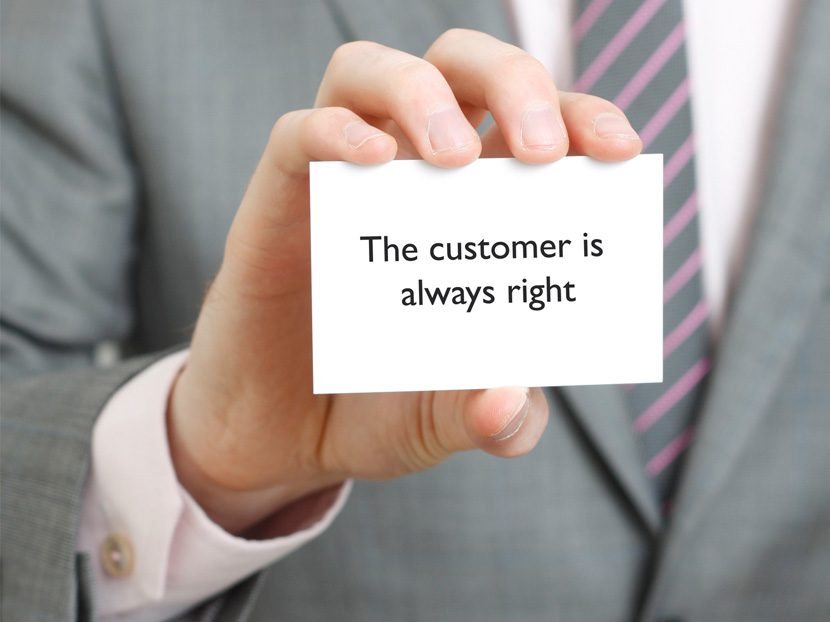Is the Customer Really Always Right?
How to differentiate your response when dealing with value buyers, price buyers and consumers that come from the not-so-good place.

We’ve all heard the statement “The customer is always right!” When you think about it, you might wonder how that can possibly be true. After all, you have probably been in discussions with consumers over some type of discrepancies. It might be over your business procedures, diagnosis, price, warranty, whatever. In those instances, if the customer is always right, does that mean you’re always wrong?
Of course not. All human beings make mistakes, including customers. Therefore, logic dictates the statement, “The customer is always right!” is, in fact, wrong. However, when consumers are wrong, and, you want to keep them as your customer, you may have to swallow your pride and close your eyes to their incorrectness.
It’s like that old joke. Rule #1 — The boss is always right. Rule #2 — When the boss is wrong, see rule #1.
The real issue you must consider is: Which type of clientele do you want to serve, and, who is the boss of your business? Since, as the owner of your business, you are responsible for your business’ operational expenses and success or failure, the answer to who is the boss is obvious. But, as the boss, you have a responsibility to your business to deliver excellence, identify and calculate your true cost, and develop prices that will allow you to recover your true cost and earn a profit above that cost. To accomplish this, you must decide which consumers you want to serve, and since you are a contractor, which consumers you will be able to enter into a meeting of the minds (that’s a contract) with.
There are three types of consumers in the marketplace — value buyers, price buyers and the consumers from hell (CFH).
Value buyers want excellence. Of course, price is always a factor. However, value buyers know how to discern the difference between cheap and least expensive. If you deliver excellence to consumers, your prices will more than likely be higher than the mediocre workmanship of those who do not deliver value to consumers since excellence costs more to produce than mediocrity. Excellent workmanship lasts longer than mediocre workmanship, therefore, excellence is less expensive.
Price buyers buy price not value, and, they more often than not, spend much more in the long run. After all, cheap isn’t cheap. Price buyers erroneously believe all PHC contractors are equal. And, you know that’s not true. There are PHC contractors who do shoddy work and offer no warranties. Then, there are those who deliver excellence and stand behind their workmanship. If you deliver excellence to consumers, and your prices are questioned, inform the consumer that you aren’t the cheapest contractor in town, but, you are the least expensive.
The CFH are misanthropic, self-serving individuals who argue about everything. They are less than two percent of the consuming public. When consumers call, explaining your terms and conditions to them before you incur cost addressing their requests will give them the opportunity to accept or reject your terms and conditions. In dealing with consumers of any type, one of those terms and conditions should be the minimum fee to send someone to observe and discuss their situation before quoting to them a price.
When a card-carrying member of the CFH accepts those terms and conditions, you must then decide whether or not you can come to a meeting of the minds (that’s a contract — and you are a contractor) with them. Good consumers (98 percent or more of the consuming public) far outnumber the CFH. But, the CFH linger in our minds when we are confronted by them. And those lingering bad experiences can cause you to make bad decisions which can affect your business in a negative way.
Example: Mr. X agrees to your procedures, terms, conditions and prices to have his request addressed immediately. You describe the task and quote the task price to which Mr. X accepts and agrees. Then, perform the service for Mr. X. After the job is done in an excellent manner and you fulfilled your obligations, Mr. X finds that Cheap Charlie Plumbing (fictitious name and my apologies to anyone named Charlie) would have done the job for half your price. He calls you and complains about the price he agreed to before you started the task and wants money back.
In this instance, there is no way that Mr. X is right. But, you have to make a decision. You can try to explain the difference between you and Cheap Charlie. This will work in some circumstances. But, if Mr. X is a card-carrying member of the CFH, it more than likely won’t.
Another option is to give him some money back. However, this doesn’t guarantee he will remain your client. It probably ensures that every future task you perform for him will end up with a renegotiating of the agreed price after the job is done. That’s not fair, and, in no way makes Mr. X right. But, it also makes you wrong for dealing with a consumer who would stoop to this tactic. Keep in mind the old saying: “Fool me once shame on you. Fool me twice shame on me.”
Your third option is to cut bait and fire him as a client. This sounds harsh, but, avoiding the CFH will make your life less stressful and frustrating. And, you can spend your valuable time turning some price buyers into value buyers, and, good value buyers into your loyal clientele. There is another benefit to this option — Mr. X will drive the Cheap Charlies of this world crazy with the same tactics he pulled on you.
Choosing the wrong option will negatively affect your business.
If you deliver excellence and stand behind your workmanship, good value buyers will become your loyal clientele. By delivering excellence, charging properly profitable selling prices, being honest and explaining the fact that you don’t get to keep all the money they pay to you because you do have operational costs, some price buyers may become good value buyers. Some may only avail themselves of your services when they can’t get Cheap Charlie. Regardless of which case, you will give yourself an opportunity to recover your operational costs, earn the reward you deserve for the delivery of excellence, and, build up a loyal client base.
Other price buyers may never call your business again. But, if they don’t want to pay the prices associated with excellence, and, that you must charge to recover your cost and earn a profit above that cost, that is their prerogative. And, you don’t need them. Let them drive the Cheap Charlies crazy and out of business.
When consumers do not agree to your terms, conditions, procedures and prices, you cannot have a meeting of the minds. But, when they agree, and, you fulfill your obligations under the agreement, the onus is on them to fulfill their obligations under the agreement. Protect yourself by putting agreements in writing. This can be done for the smallest of jobs by having a contract/invoice form that shows the obligations of both parties.
As a contractor, you must come up with sound business protocols. One of those is filtering out the CFH. I am not suggesting that anyone who disagrees with you is a member of the CFH. Your customer service representatives must be capable of addressing consumers in a polite, intelligent, correct, rapid, and, above all, honest manner to keep the good customers your clients. When they are having difficulty doing that, a supervisor who can remedy the situation should step in. If you are the only person in your business, you are the customer rep and supervisor. Make sure all customer service reps hone their service rep abilities.
When the phone rings, call-takers must put their best foot forward. They must be cheery, informative, sincere, honest and caring to consumer requests. They should not be robotic. They should engage in conversation with the consumer that allows the consumer to feel comfortable with your business.
In dealing with consumers, another old joke comes to mind “Where can a gorilla who weighs 800 pounds sit? Answer: Anywhere he wants. He’s 800 pounds.”
Your clientele who allow you to recover your operational costs and make a profit above those costs are your bread and butter. Some may be 800-pound gorillas, while others may be 700, 600 etc.
But, the CFH have no value to your business and are to be avoided. They are the people who will give you bad reviews on the internet. Not working for them is better than serving them in an excellent manner at an agreed price, and then, have these misanthropes spew lies about your business. When they write false maliciously injurious reviews about your business, fight back. Complain to the internet service housing their malicious remarks.
If this service is one of those that you pay to advertise with, tell them that if they don’t seek the truth regarding the situation, you will have to legally end your subscription to their service. If enough contractors have the chutzpah to do this, the cash flow of those internet services will slow down, and they will have to start to understand fair is a two-way street not a dead end.
Unfortunately, the misanthropes have time on their hands to be miserable people. Ask your good clientele to take the time to write reviews. The fact that they are your good clientele should assure their reviews will be helpful to your business and counteract the libelous rantings of the CFH.
I can help you identify and calculate your true cost of operation, develop properly profitable selling prices and train your staff in easier ways to do their jobs so they can assist good buyers and avoid the CFH.
If you have an opinion on this article, want an opportunity to attain your contractor profit advantage, would like information on the ways I can help you, or, would like to order a copy of my Readily Available Pricing Information Digest pricing guide which is customized to your true cost of labor and overhead, and, puts prices at your fingertips for rapid and profitable price quoting, give me a call. I have to go now. My phone is ringing.
Richard P. DiToma has been involved in the PHC industry since 1970. He is a contracting business coach/consultant and an active PHC contractor. For information about the Contractor Profit Advantage or to contact Richard: call 845-639-5050; email richardditoma@verizon.net; mail to R & G Profit-Ability, Inc. P.O. Box 282, West Nyack. NY 10994.





